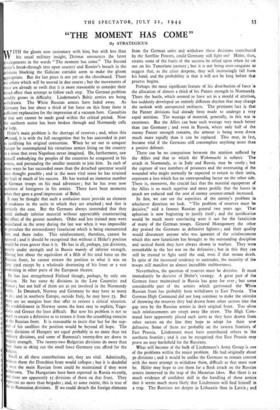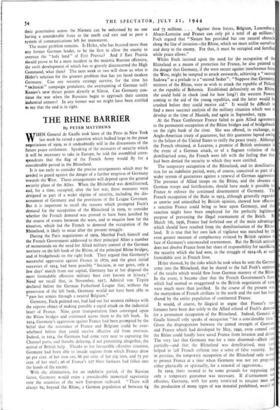"THE MOMENT HAS COME"
By STRATEGICUS ITH the gloom now customary with him, but with less than his usual military insight, Dittmar announces the latest velopments in the words " The moment has come." The Second rmy's break-through into open country and Koniev's breach in the fences blocking the Galician corridor seem to make the gloom propriate. But the last piece is not yet on the chessboard. There others which will be moved in due course ; but the movements of ese are already so swift that it is more reasonable to consider their road effect than attempt to follow each step. The German problem teadily grows in difficulty. Lindemann's Baltic armies are being ithdrawn. The White Russian armies have faded away. As ermany has lost about a third of her force on this front there is ufficient explanation for the impression of a vacuum here. Casualties f that sort cannot be made good within the critical period. Now e southern sector has been broken through and Normandy calls sir help.
Hitler's main problem is the shortage of reserves ; and, when this fistated, it is with the full recognition that he has succeeded in part justifying his original contention. When he set out to conquer urope he contemplated his victorious armies living on the country n a sense that even Napoleon never imagined. He, furthermore, saw mself embodying the peoples of the countries he conquered in his rmies, and persuading the smaller neutrals to join him. In each of ese ways he has succeeded more than the detached spectator would ave thought possible ; and in the more vital sense he has retained e fruit of much of his success. He has wasted an immense number f German troops on his mad adventure ; but he has even now umbers of foreigners in his armies. There have been moments hen they gave a good impression of Babel.
It may be thought that such a confusion must provide an element
f weakness in the units to which they are attached ; and that is ertainly the case. But the Germans always contended "that they ould embody inferior material without appreciably counteracting e effect of the greater numbers. Older and less trained men were ssimilated in the army during the last war when it was impossible
o postulate the extraordinary fanaticism which is being encountered ere and there today. This reinforcement, therefore, cannot be gnored ; and it should be recognised that without it Hitler's position ould be even graver than it is. He has in all, perhaps, 320 divisions, ostly under strength and in Russia mainly of inferior strength. aving lost about the equivalent of a fifth of his total force on the ussian front, he cannot restore the position to what it was on une 23rd except by a wholesale shortening of his front or a vast akening in other parts of the European theatre.
He has just strengthened Finland though, perhaps, by only one Nision. He has some 65 divisions in the Low Countries and rance ; but not half of them are as yet involved in the Normandy ttle. In Denmark, Norway and Germany he may have as many s 20 ; and in southern Europe, outside Italy, he may have 23. But ere are no margins here that offer to restore a critical situation. Is establishment in Norway seems the least easy to explain, Yugo- avia and Greece the least difficult. But now his problem is not so uch to create a defensive as to restore it from the crumbling remains the Russian front. It is reasonable to insist that but for the sup- rt of his satellites the position would be beyond all hope. The lily divisions of Hungary are equal probably to no more than ten dinary divisions, and some of Rumania's twenty-five are down to rigade strength. The twenty-two Bulgarian divisions do more than eir share in eking out the small force Germany can afford for the alkans.
Small as all these contributions are, they are vital. Admittedly, thout them the Danubian front would collapse ; but it is doubtful even the main Russian front could be maintained if they were Adrawn. The Hungarians have been reported in Russia recently, there are apparently 15 divisions of them on that front. They Present no more than brigades ; and, to some extent, this is true of e 20 Rumaniandivisions. If we could detach the foreign elements
from the German units and withdraw these divisions contributed by the Satellite Powers, could Germany still fight on? Hitler, then, retains some of the fruits of the success he relied upon when he set out on his Tamerlane journey ; but it is not being over-sanguine so suggest that, as the crisis deepens, they will increasingly fall from his hand, and the probability is that it will not be long before that process begins.
Perhaps the most significant feature of his distribution of force is the allocation of almost a third of his Panzer strength to Normandy. There the battle, which seemed to have set in a mould of attrition, has suddenly developed an entirely different rhythm that may change the outlook with unexpected swiftness. The pertinent fact is that the Panzer divisions had already been made to undergo a very rapid attrition. The wastage of material, generally, in this war is enormous. But the Allies can bear such wastage very much better than can Germany ; and even in Russia, where only half of the enemy Panzer strength remains, the armour is being worn down. much more rapidly than it can be replaced. This may, in fact, become vital if the Germans still contemplate anything more than a passive defence. .
There can be no comparison between the attrition suffered by the Allies and that to which the Wehrmacht is subject. The attack in Normandy, as in Italy and Russia, may be costly ; but the capture of vast numbers of prisoners and the overruning of the wounded who might normally be expected to return to their unit; represent a loss which has no corresponding factor on the other side. There is, moreover, the crucial fact that the material equipment of the Allies is so much superior and more prolific that the losses in attack are reduced and the cost of enemy counter-attack increased.
In fine, we can see the asperities of the enemy's problem in whichever direction we look. "The problem of reserves must be decisive," said a famous Russian general two years ago. That aphorism is now beginning to justify itself ; and the justification would be much more convincing were it not for the fanaticism of many of the German troops. General Montgomery the other day praised the Germans as defensive fighters ; and their quality would disconcert anyone who was ignorant of the reinforcement which this new fanaticism has brought to the outstanding discipline and tactical finish they have always shown in warfare. They were remarkable in the last war on the defensive ; but in this they can still be trusted to fight until the end, even if that means death. In spite of the increased tendency to surrender, the majority of the troops still manifest an almost incredible stubbornness.
Nevertheless, the question of reserves must be decisive. It must immediately be decisive of Hitler's strategy. A great part of the German force maintained in Russia has gone for ever ; but some considerable part of the armies which garrisoned the White Russian front has probably been withdrawn to East Prussia. The German High Command did not long continue to make the mistake of throwing the reserves they had drawn from other sectors into the gap torn by the Russian armies in their original front. Too often such reinforcements are swept away like straw. The High Com- mand have apparently placed such units as they have drawn from other sectors on the line they hope to adopt for their new defensive. Some of them are probably on the eastern frontiers of East Prussia. Lindemann must have contributed others to the northern frontier ; and it can be recognised that East Prussia may prove no easy battlefield for the Russians.
What will become of the bulk of Lindemann's Army Group is one of the problems within the major problem. He had originally about 3o divisions ; and it would be unlike the Germans to remain content with the mere attempt to withdraw them, difficult as that must now be. Hitler may hope to use them for a flank attack on the Russian armies immersed in the trap of the Masurian lakes. But there is so much evidence of confident skill in the handling of these armies that it seems much more likely that Lindemann will find himself in a trap. The Russians are deeper in Lithuania than in Latvia ; and their penetration across the Niemen can be welcomed by no one having a considerable force to the north and east and so poor a system of communications left for manoeuvre.
The major problem remains. Is Hitler, who has boasted more than any former German leader, to be the first to allow the enemy to overrun the " holy land " of East Prussia? And if East Prussia should prove to be a mere incident in the majestic Russian offensive, the swift development of which has so gravely disconcerted the High Command, what then? The next week or two will show us what is Hitler's solution for the greatest problem that has yet faced modern Germany. Can any western strategy survive, for the time his " technic-al " campaign postulates, the overrunning of German soil? Koniev's new thrust points directly at Silesia. Can Germany con- tinue the war when the Russians begin to approach their eastern industrial centres? In any former war we might have been entitled to say that the end is in sight.























 Previous page
Previous page